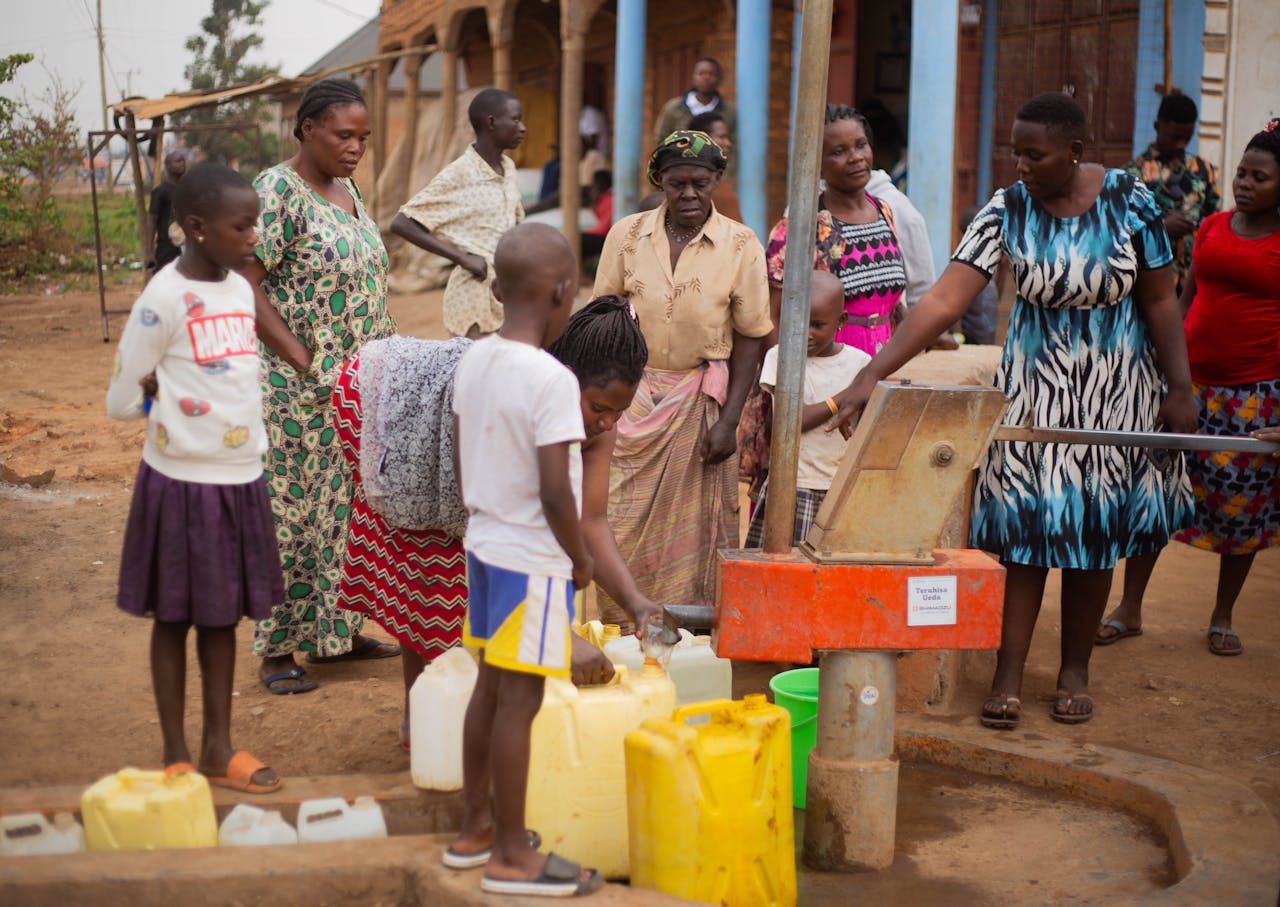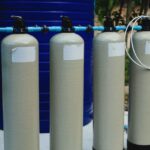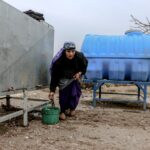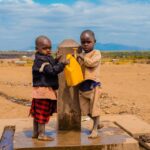How Solar-Powered Pumps Are Revolutionizing Water Access in Rural Togo

Access to clean water is a big challenge in many rural areas of Togo. People often walk long distances to fetch water, but sometimes, the water they get is not clean. Many communities depend on wells and hand pumps, however, these do not always work well, especially in dry seasons.
Solar-powered pumps are changing this situation. These pumps use energy from the sun to pull water from underground, providing a steady supply of clean water. They are becoming a game-changer for rural areas, making life easier for families, farmers, and schools.
The Water Crisis in Rural Togo
Many villages in Togo do not have easy access to safe drinking water. Some rely on rivers and lakes, but these can be dirty or dry up in certain seasons. Others depend on traditional wells, but fetching water manually takes a lot of time and effort.
The main problems include:
- Long distances – Many women and children spend hours fetching water.
- Dirty water – Some water sources are contaminated, causing diseases like cholera and diarrhea.
- Unreliable supply – During the dry season, wells and streams dry up, leaving people without water.
This lack of water affects health, education, and farming. But solar-powered pumps are helping to fix these problems.
How Solar-Powered Pumps Work
Solar-powered pumps use energy from the sun to move water from underground to storage tanks or directly to homes and farms. Here’s how they work:
- Solar panels collect sunlight and turn it into electricity.
- The electricity powers a pump that pulls water from a well or borehole.
- Water is stored in large tanks or sent through pipes to where it is needed.
These pumps work even in remote areas because they don’t need fuel or electricity from a power grid. As long as there is sunlight, the pump can run.
Benefits of Solar-Powered Pumps
Solar pumps are changing the way rural communities in Togo get water. The key benefits include:
- Reliable water supply – Unlike hand pumps, solar-powered pumps work throughout the day and provide a steady flow of water.
- Less effort needed – People no longer have to carry heavy buckets of water over long distances.
- Better health – Clean water reduces the risk of waterborne diseases.
- Helps farmers – Farmers can now water their crops more easily, leading to better harvests.
- Eco-friendly – Solar energy does not cause pollution, unlike fuel-powered pumps.
Because of these benefits, solar-powered pumps are being installed in more villages, bringing hope to people who have struggled with water shortages for years.
How Solar-Powered Pumps Are Changing Lives
Solar-powered pumps are making life easier for people in rural Togo, especially in villages where clean water is hard to find. Before these pumps, families had to walk long distances to fetch water from rivers or wells, often using unsafe water that made them sick. Now, with solar-powered pumps, clean water flows closer to homes, saving time and improving health.
In many villages, children, especially girls, used to spend hours fetching water instead of going to school. With solar-powered pumps, they have more time for education and play. Women also benefit because they no longer have to carry heavy water containers over long distances. Instead, they can focus on farming or small businesses, improving their family’s income.
Health has also improved because cleaner water means fewer diseases, like diarrhea and cholera. Hospitals and clinics in rural areas now have better water access, which helps with hygiene and patient care. These pumps are changing lives by bringing safety, education, and economic growth to rural communities.
Government and NGO Efforts to Expand Solar Water Solutions
The government of Togo, along with NGOs, is working to expand the use of solar-powered pumps in rural areas. Many of these projects are funded by international organizations and local charities that want to improve clean water access.
One of the leading NGOs in this effort is Aqua Maya, a public charity focused on providing safe and clean water to underserved communities in West Africa. Aqua Maya is helping to install solar-powered pumps in villages that lack reliable water sources. Their goal is to reduce waterborne diseases and ensure that people, especially children, have access to clean water for drinking and hygiene.
The Togolese government has also introduced policies to support renewable energy for water access. Some projects receive funding from partnerships with foreign countries and organizations that promote clean energy and water safety. However, there is still a need for more investment to bring these solutions to every village that needs them.
Challenges of Implementing Solar-Powered Pumps
While solar-powered pumps are a great solution for water access in rural Togo, there are some challenges that make it difficult to install and maintain them. These include:
1. High Initial Costs
-
Solar-powered pumps require a lot of money to buy and install.
-
Many rural communities cannot afford them without help from NGOs or the government.
2. Funding Difficulties
-
Even though the pumps save money in the long run, finding money for new projects is hard.
-
Some projects start but do not finish because of a lack of funds.
3. Technical Challenges
-
The pumps need proper installation and regular maintenance to work well.
-
In some areas, there are no trained technicians to repair them when they break down.
4. Weather-Related Concerns
-
Since the pumps rely on sunlight, they may not work as well on cloudy or rainy days.
-
In areas with long rainy seasons, water supply could be affected.
5. Lack of Community Training
-
Some communities do not receive enough training on how to take care of the pumps.
-
Without proper knowledge, misuse or lack of maintenance can cause the system to fail.
6. Theft and Vandalism
-
Solar panels and pump parts can be stolen or damaged if security measures are not in place.
-
Some villages struggle to protect the systems from theft.
Even with these challenges, many organizations, including Aqua Maya, are working to solve these issues by providing funding, training local technicians, and raising awareness about protecting solar water systems.
The Future of Solar-Powered Water Systems in Togo
The future looks promising for solar-powered water pumps in Togo. With growing support from NGOs, the government, and private donors, more villages are expected to get access to clean water through solar technology.
New technologies are also making solar water systems more efficient. Advances in solar panel designs allow pumps to work better even on cloudy days. Some companies are developing smart monitoring systems that can detect issues early and send alerts when repairs are needed, reducing downtime.
There is also a push for scaling up these projects nationwide. More funding from international donors and businesses can help expand solar-powered water access across rural Togo. If these efforts continue, solar-powered pumps could one day provide clean water to every village in need, making water scarcity a thing of the past.
How Local Communities Can Support and Sustain Solar Water Projects
For solar-powered water pumps to keep working in the long run, local communities must play an active role in maintaining and managing them. Here are some ways they can help:
1. Community Involvement in Maintenance
When a village gets a solar-powered pump, the people must take responsibility for keeping it in good condition. This means forming water committees where selected community members monitor the system, report issues, and ensure the pump is used correctly. These committees can work with NGOs and the government to get repairs done quickly when needed.
2. Training Local Technicians
One of the biggest challenges with solar-powered pumps is that when they break down, there are not always skilled workers available to fix them. To solve this, training local technicians is important. When repairs can be done locally, downtime is reduced, and water access remains steady.
3. Raising Funds for Sustainability
Although solar-powered pumps are cheaper to run than fuel-powered systems, they still require money for occasional repairs and replacements. Villages can create community savings groups where each household contributes a small amount to a maintenance fund. This money can be used for repairs or upgrading the system when needed.
Some communities also work with local businesses or agricultural groups to raise funds. For example, farmers who benefit from the pumps for irrigation can contribute a small fee to keep the system running.
4. Promoting Awareness and Responsible Water Use
Community members must also learn about responsible water use. This includes teaching people not to waste water, making sure children understand how to use the pump correctly, and preventing activities that could damage the system.
When communities take ownership of these projects, they are more likely to last for many years, providing clean water for future generations.
Conclusion
Solar-powered water pumps are changing the way people in rural Togo access clean water. By using energy from the sun, these pumps provide a steady supply of safe water without relying on expensive fuel or manual labor. They have reduced the need for long, tiring walks to fetch water and have improved health and sanitation in many villages.
However, challenges such as high initial costs, technical maintenance, and weather-related issues still exist. To keep these projects running, it is important for communities, NGOs, and the government to work together. Organizations like Aqua Maya are playing a big role in making clean water more accessible, by funding projects and training local people to maintain the systems.
With continued investment and support, solar-powered pumps can become a long-term solution for clean water access in rural Togo. More communities can benefit and fewer people will have to worry about getting sick from unsafe water. By working together, we can ensure that every village in Togo has a reliable source of clean water for years to come.
Sources
1. https://www.unicef.org/wash
2. https://www.grundfos.com/us/about-us/cases/free-energy-from-the-sun-brings-relief-in-togo
5. https://mapafrica.afdb.org/en/projects/46002-P-TG-FA0-012






